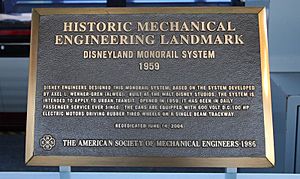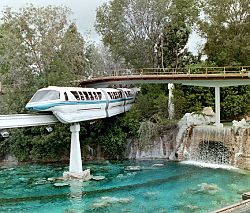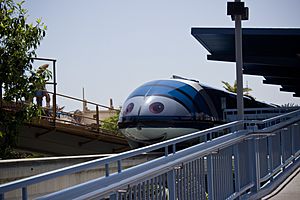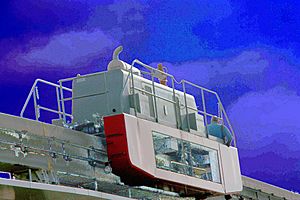Disneyland Monorail System facts for kids
Quick facts for kids Disneyland Monorail System |
|||||||||
|---|---|---|---|---|---|---|---|---|---|
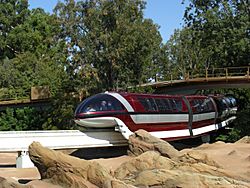
Mark VII Monorail Red passes over the Finding Nemo Submarine Voyage show building
|
|||||||||
|
|||||||||
| Ride statistics | |||||||||
| Attraction type | straddle-beam Monorail | ||||||||
| Designer | WED Enterprises | ||||||||
| Height | 41 ft (12 m) | ||||||||
| Speed | 30 mph (48 km/h) | ||||||||
| Vehicle type | Monorail Trains | ||||||||
| Vehicles | 3 | ||||||||
| Riders per vehicle | 120 | ||||||||
| Duration | 11 minutes | ||||||||
| Vehicle names | Monorail Red, Monorail Blue, Monorail Orange | ||||||||
| Track gauge | Single straddle-beam | ||||||||
The Disneyland Monorail System is a super cool ride and a way to get around at the Disneyland Resort in Anaheim, California. It was the very first monorail in the Western Hemisphere to run every day!
Walt Disney himself imagined the monorail as a way people could travel in the future. It opened on June 14, 1959.
Contents
History of the Monorail
Walt Disney wanted the monorail to be a real way for people to travel. But back then, cars were becoming very popular in America, especially in Los Angeles. So, most monorails in the U.S. ended up being in Disney parks, except for one in Seattle.
Disney designer Bob Gurr led a team that built the first monorail cars. They worked hard to finish the first train, called Red Mk 1, just in time for Tomorrowland's reopening.
Early Days and Expansion
The Disneyland Monorail first opened on June 14, 1959. It was part of a big expansion in Tomorrowland at Disneyland. Other new attractions included the Matterhorn Bobsleds and the Submarine Voyage.
At first, the monorail was just a sightseeing ride. The Mark I trains (Red and Blue) had three cars each.
In 1961, the monorail became a real transportation system. The track was made longer, going 2.5 miles outside the park. A second station was built at the Disneyland Hotel.
The Mark II trains, which had four cars, were introduced. A new Yellow train also joined the fleet.
In 1968, the Mark III Monorail Green train arrived. All the stations were made longer to fit the new, more modern five-car Mark III trains.
Mark V Monorail Trains
By the early 1980s, the Mark III trains were getting old. So, in 1985, Disneyland started updating them. The old trains were taken apart and rebuilt as Mark V trains.
The Mark V trains looked different. They lost the "bubble-top" driver's area and got a sleek, modern look. They also had closed passenger areas with windows that could open.
After a monorail fire at Walt Disney World in 1985, new safety features were added. These included a handrail on the roof and emergency exit hatches. The new Mark V trains were Purple, Orange, Blue, and Red.
In 1994, the monorail track was moved a bit to make space for the Indiana Jones Adventure ride.
Around 1999, the monorail closed for long periods. This was because the Disney California Adventure theme park was being built where the monorail track passed. The old Disneyland Hotel Station was completely torn down. A new station, now called the Downtown Disney Station, was built in the same spot.
The monorail started running again in 2000, but only part of the track was open. In 2001, it was fully open again. It now passed through Disney's Grand Californian Hotel & Spa and showed off the new park.
Mark VII Monorail Trains
The Mark V trains were later updated to Mark VII trains. There was no Mark VI at Disneyland; that model is used at Walt Disney World.
The first Mark VII train, Monorail Red, arrived in December 2007. It started carrying guests in July 2008. Monorail Blue arrived in April 2008 and started service in September 2008. Monorail Orange arrived in August 2008 and began service in April 2009.
The Mark VII fleet has three trains: Red, Blue, and Orange.
In 2012, the monorails got fun new stickers! They had eyes and a mouth on the front, making them look like characters from the Cars movies. Monorail Red became Manny, Blue became Mandy, and Orange became Mona. They even had special voices! These stickers were removed by early 2013.
How the Monorail Works
The Disneyland Monorail has two stations. One is in Tomorrowland, and the other is in the Downtown Disney District.
When the monorail first opened, it was just a round trip ride with no stops. In 1961, the track was extended to the Disneyland Hotel, making it a real way to travel.
The original Hotel station was replaced in 1999 by the new Downtown Disney Station. To ride the monorail, you need a valid admission ticket to Disneyland Park.
The Monorail Journey
The monorail travels in only one direction. All passengers board from a single platform.
Leaving Tomorrowland station, the monorail crosses over the Disneyland Railroad. It then goes along Harbor Boulevard, showing you the edge of the park.
Next, it turns into Disney California Adventure. You'll see rides like Monsters, Inc. Mike & Sulley to the Rescue!. The track goes right through the entrance area of Disney California Adventure Park. You can see Disneyland Park on your right and Disney California Adventure Park on your left.
The monorail then passes through Disney's Grand Californian Hotel & Spa. It makes a sharp turn and enters the Downtown Disney station. This station has a natural, plant-filled design.
After a short stop, the train leaves Downtown Disney. It makes a small loop before crossing back over the area between the two parks. Then it heads back to Disneyland.
Once inside Disneyland, the monorail crosses the railroad again. It goes through many turns and curves around Tomorrowland. The track travels above the Submarine Lagoon and Autopia. You'll even cross the lagoon four times!
The track then curves around the Matterhorn Bobsleds, giving you a great view of Fantasyland. Finally, it turns left to return to the Tomorrowland Station.
Monorail Sounds
All monorails have special air horns. The pilot sounds the horn twice when leaving a station. They also use it when passing certain points on the track or when approaching the Matterhorn. If a bird lands on the track, they honk the horn. It's also a friendly greeting to passing Disneyland Railroad trains!
Keeping the Monorail Running
Monorail Shop
The "Monorail Shop" is where the monorails are kept and fixed. It's located behind the "it's a small world" ride. This facility has space for four monorails on its top level. The bottom level holds the five steam locomotives that circle Disneyland.
Monorails enter this shop by stopping at a special switch. Then, the switch moves, and the monorail slowly travels into the shop. Another switch guides it to the correct track. Trains are never left outside because they get checked and fixed every night.
Maintenance Tractor
There are special diesel-powered "work tractors" that help maintain the monorail track. Every morning, they inspect the beam. They also trim plants that are too close and clean the electric rails that power the trains. These tractors are strong enough to pull a full monorail train back to a station or the shop, even if the track power is off.
Changing Monorail Trains
When old monorail trains need to be replaced with new ones, it's a big job! Each car segment is prepared individually. It's then lifted off the track by a special crane. The car is placed onto a truck trailer for transport.
The diesel tractor helps move each car in and out of the maintenance shop. Putting new train cars on the track is the reverse process. Each new train is carefully tested for many months before it can carry guests.
Monorail Safety
Safety is very important for the monorail.
Emergency Evacuation
If there's an emergency, how guests leave the train depends on where it is.
If a train stops at a station, guests can simply step out onto the platform. Even if the doors are closed, a cast member can open them from the outside.
If a train stops on the open track, guests can exit through emergency hatches in the roof. They climb onto the top of the train. These hatches also allow guests to move to a nearby car if there's a problem in their car. The Disneyland Fire Department helps guests safely leave a stopped train.
Platform Safety
The gates at the stations are opened by hand. They stay closed until a train arrives and cast members say it's safe to board.
The trains get their power from a 600-volt DC electric rail. This rail runs along the right side of the monorail beam. It's similar to the "third rail" that powers subway trains.
Quick Facts About the Monorail
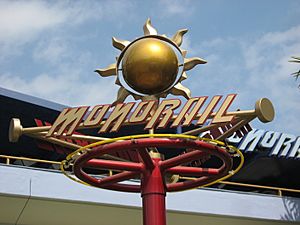
- Grand opening: June 14, 1959
- Designer: WED Enterprises
- Trains: 3 - Mark VII Red, Mark VII Blue, and Mark VII Orange
- Max Trains on Track: 3
- Track length: 2.5 miles (4.0 km)
- Ride duration: About 10 minutes and 30 seconds
- How it works: Each train has six electric motors. These motors are in special trucks shared between the cars.
- Cost: In 1959, building the whole system cost over $1 million per mile.
- Fun Fact: During the opening ceremony, the special scissors didn't cut the ribbon! So, Walt Disney just tore it.
Disneyland Monorail Train Models
Over the years, the Disneyland Monorail has had several different models of trains.
Mark I and Mark II Trains
- Mark I: 1959 - 1961
- These were the first trains.
- They had 3 cars.
- Colors: Red and Blue.
- Mark II: 1961 - 1969
- These were similar to Mark I but had some small updates.
- They had 4 cars (one new car was added to Red and Blue trains, and a new Yellow train was built).
- They had a bigger dome on top of the front car.
- Colors: Red, Blue, and Yellow.
Mark III and Mark V Trains
- Mark III: 1969 - 1987
- This was a completely new design.
- They had 5 cars.
- They were about 137 feet (42 meters) long.
- Colors: Red, Blue, Yellow, and Green.
- Mark V: 1987 - 2008
- These trains also had 5 cars.
- They were designed by Walt Disney Imagineering.
- Each car could seat 24 passengers. The tail cone seated 7, and the nose cone seated 5 passengers plus the driver.
- Total passengers per train: 132.
- The Mark V trains looked like the Mark IV monorails at Walt Disney World.
- Colors: Red, Blue, Orange, and Purple.
Mark VII Trains
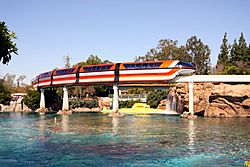
- Mark VII (Mk7): 2008–Present
- These trains have a sleek, retro look.
- They have new seating inside, with some seats facing inward.
- The main cabins hold 22 passengers. The tail cone holds 6, and the nose cone holds 4 passengers plus the pilot.
- Colors: Red, Blue, and Orange.
- The first Mark VII, Red, arrived in December 2007 and started service in July 2008.
- The second, Blue, arrived in April 2008 and started service in September 2008.
- The third, Orange, arrived in August 2008 and started service in April 2009.
 | Delilah Pierce |
 | Gordon Parks |
 | Augusta Savage |
 | Charles Ethan Porter |


